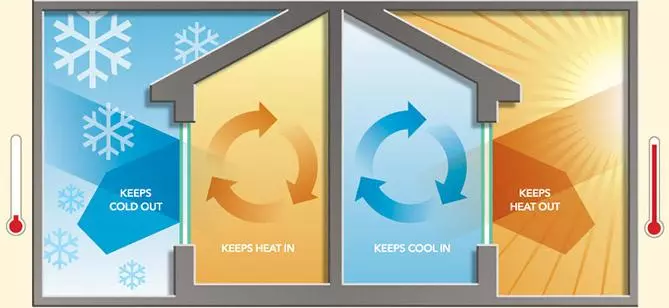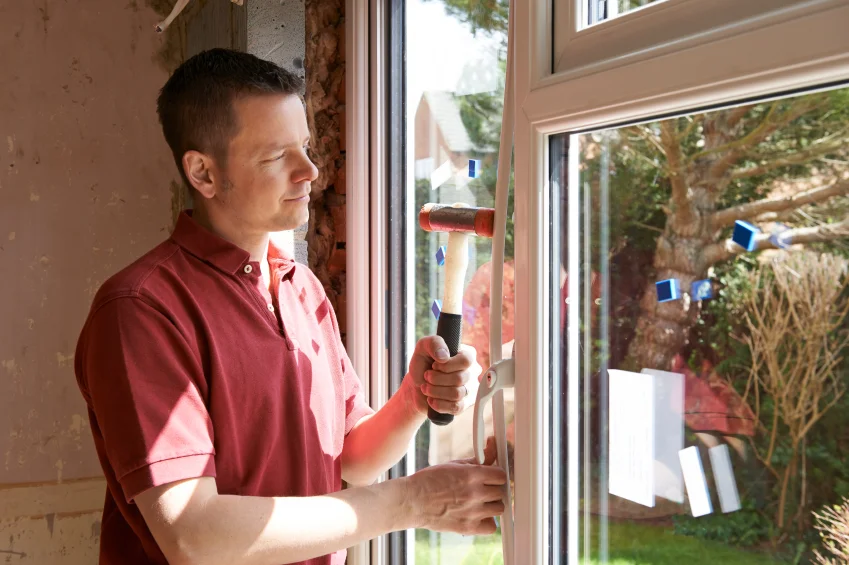When it comes to improving your home’s energy efficiency, replacing your windows can be a significant step. Windows are one of the main culprits for heat loss in homes, leading to higher energy bills and lower comfort levels. You can solve that problem by installing energy-efficient windows! They’re designed to keep your home warm in winter and cool in summer while reducing your carbon footprint and saving you money over time. But are they worth the cost? In this blog post, we’ll explore everything you need to know about energy efficient windows versus regular windows so that you can make an informed decision when choosing new windows for your home.
What are energy efficient windows?
Heat transfer between your home’s interior and exterior is minimized with energy-efficient windows. They feature advanced glazing technologies, such as low-e coatings and gas fills, that can reduce energy loss by up to 70%. These windows typically have multiple panes of glass separated by a vacuum or insulating gas, which reduces thermal conductivity.
One of the most significant benefits of energy efficient windows is their ability to keep
your home comfortable year-round. Unlike regular windows, they can prevent unwanted drafts in winter while blocking out solar heat gain in summer. This means you won’t have to rely on heating and cooling systems as much, resulting in lower energy bills.
Another advantage is that they can improve indoor air quality since they often come with better weatherstripping and seals than regular windows. This helps to prevent dust, pollen, and other outdoor pollutants from entering your home through gaps around the window frames.
Energy efficient windows are an excellent investment for homeowners looking to save money on their utility bills while reducing their environmental impact.
How do energy efficient windows work?
Energy efficient windows work by preventing heat transfer through the glass, which helps to keep your home at a comfortable temperature and reduces energy costs. There are several ways that energy efficient windows achieve this.
They have multiple panes of glass with an insulating layer of air or gas between them. This provides better insulation than single-pane windows, as it reduces the amount of heat that can pass through the glass.
Many energy efficient windows use low-emissivity (low-e) coatings on the glass. These coatings reflect some infrared radiation while still allowing visible light to pass through. This means that in winter, heat from inside your home is reflected back into the room rather than escaping outside, while in summer, incoming solar radiation is reflected away from your home.
Some types of energy efficient windows also have frames made from materials such as vinyl or fiberglass which provide better thermal insulation than traditional aluminum frames.
These features work together to reduce heat loss and gain through your windows and help you save money on heating and cooling costs year-round.
The benefits of energy efficient windows
Energy efficient windows are designed to minimize heat loss and maximize energy conservation, which means they have a wide range of benefits for homeowners.
They can significantly reduce your energy bills by keeping your home warm in the winter and cool in the summer without relying as much on heating or air conditioning systems. This also helps to decrease your carbon footprint and promote sustainability.
Energy efficient windows are often more durable than regular windows due to their high-quality materials and construction methods. They can withstand extreme weather conditions better, preventing damage from storms or debris.
These types of windows offer improved sound insulation compared to regular ones – this is especially important if you live near busy roads or noisy neighborhoods.
They can increase the value of your property. Energy efficiency has become an increasingly important factor that potential buyers consider when looking for a new home.
Investing in energy efficient windows is a smart choice for homeowners who want to save money while simultaneously reducing their environmental impact and improving their quality of life at home.
The drawbacks of energy efficient windows
While energy efficient windows have numerous benefits, there are also some drawbacks that homeowners should be aware of before deciding to install them in their homes.
One potential drawback is the cost. Energy efficient windows tend to be more expensive than regular windows due to the advanced materials and technology used during manufacturing. However, it’s important to note that this extra cost can often be offset by long-term savings on energy bills.
Another downside is that these windows may not always match the style or aesthetic of certain homes. While most manufacturers offer a variety of styles and designs, some homeowners may find it difficult to find an option that fits well with their home’s existing architecture.
Additionally, installation can sometimes require structural changes or modifications to the home, which could add even more costs and time to the process.
While energy-efficient windows do help reduce heating and cooling costs year-round, they may not provide significant benefits for those who live in moderate climates where temperature fluctuations are minimal.
While there are some drawbacks associated with energy-efficient windows such as increased upfront cost and limited stylistic options at times – they still come highly recommended if you’re looking for long term monetary savings on your utility bill!
Are energy efficient windows worth the cost?
Energy efficient windows certainly come with a higher price tag compared to regular windows, but the question is whether or not they are worth the cost. Several factors determine the answer.
If you live in an area where energy costs are high, then investing in energy efficient windows could save you money in the long run. These windows can help reduce your utility bills by keeping your home cooler in summer and warmer in winter.
If you plan on staying in your home for many years to come, then upgrading to energy efficient windows could be a wise investment. Not only will they improve the comfort of your home, but they can also increase its resale value.
However, if you’re planning on selling your property soon and don’t want to spend too much money on upgrades that won’t pay off immediately, then regular windows may be a better option for you.
The decision of whether or not to invest in energy efficient windows comes down to weighing up the initial cost against potential long-term savings and benefits.
How to choose the right windows for your home
Choosing the right windows for your home can be overwhelming, but with a little research and consideration, you can make an informed decision. First, think about your climate and weather patterns. If you live in a cold area, look for windows with low U-factors to reduce heat loss. For hot areas, consider windows with low solar heat gain coefficients to minimize heat gain.
Next, consider the materials used for the frame and glass. Vinyl frames are affordable and low maintenance while wood frames offer a classic look but require more upkeep. Double-pane glass is standard for energy efficiency but triple-pane offers even better insulation.
Don’t forget about style! Windows come in different shapes and sizes – choose what fits your home’s aesthetic best. Also keep in mind ventilation needs – do you want casement or sliding windows?
Don’t skimp on installation quality – poorly installed windows can negate all their benefits. Look for reputable contractors with experience installing energy efficient windows.
By considering these factors when choosing new windows for your home, you’ll be able to make an informed decision that maximizes both comfort and energy savings!
Conclusion
After considering the benefits and drawbacks of energy efficient windows versus regular windows, it’s clear that investing in energy efficient windows can greatly benefit homeowners in terms of long-term savings on utility bills and reducing their carbon footprint. However, the upfront cost can be a deterrent for some.
When choosing the right windows for your home, it’s important to consider factors such as climate, orientation of your home, and budget. Consulting with a professional window installer can also help ensure you make an informed decision.
Whether or not energy efficient windows are worth the cost depends on individual circumstances. But with their numerous benefits and potential for long-term savings, they are definitely worth considering when looking to upgrade your home’s windows.




